3 min listen

Sheena Shah: The Financialization of Cryptocurrency
Sheena Shah: The Financialization of Cryptocurrency
ratings:
Length:
3 minutes
Released:
Dec 14, 2021
Format:
Podcast episode
Description
Cryptocurrency companies have begun to act as banks in the US, and while regulators have expressed concerns over interest rates and the primacy of the dollar, this interplay has only just begun.----- Transcript -----Welcome to Thoughts on the Market. I'm Sheena Shah, Lead Cryptocurrency Analyst for Morgan Stanley Research. Along with my colleagues, bringing you a variety of perspectives, I'll be talking about the escalating financialization of cryptocurrency markets. It's Tuesday, December 14th at 2:00 p.m. in London. BYOB - Be Your Own Bank. This has been the clarion call of Bitcoin evangelists since its very inception. But in an ironic turn of events, crypto companies Avanti, Anchorage and Kraken have all become banks in the US. Not in the sense espoused by bitcoin maximalists, but in the fiat - that is to say, government regulated sense. And regulators have shone much of their spotlight on the conspicuously outsized interest rates on offer to depositors through crypto lending. On the 10th of December, you could deposit a cryptocurrency called USDC with a company called BlockFi and receive an interest rate of 9%. Concern has arisen from the fact that the issuers of USDC aim to control its value, such that a single USDC should, in theory at least, always fetch a value of approximately one U.S. dollar. The disparity between a 9% rate on what is essentially a proxy for the dollar and the historically low rates on actual dollar deposits at retail banks, has regulators concerned about the emergence of a parallel banking system. The irony here is that it was preexisting banking regulation itself that played a hand in creating this high rate. Traditional banks have turned down crypto traders due to regulatory risk, and so these traders were forced to borrow from the crypto markets and offer lenders higher rates of return. Nevertheless, US regulators appear to be taking measures to limit competition with the dollar banking system. New Jersey regulators have ordered BlockFi to stop offering high interest crypto deposit accounts from February next year. And in September, the Securities and Exchange Commission sent Coinbase a Wells notice, following which Coinbase aborted a plan to offer 4% interest on USDC deposits. Ultimately, regulators will have to decide how aggressively they want to safeguard the primacy of the dollar. They could stymie much of the industry to be sure or hope the dollar stands up to scrutiny in order to allow the crypto industry to grow. The longer they wait, the higher the risk. Following multi-trillion stimulus packages and over a decade of quantitative easing, the dollar has been left as open to competitors as it has been since the Bretton Woods agreement in 1944. Investors should keep an eye on the direction that regulators take in the face of this and the broad spectrum of outcomes those regulations might portend for crypto valuations, ranging anywhere from new highs to the old lows of bygone price cycles. The meeting of crypto culture and traditional banking regulation is a seminal moment for the crypto industry. I, for one, am excited to see how this interplay evolves. Crypto companies are becoming more like banks, just as traditional banks have themselves begun to offer crypto products. Thanks for listening! If you enjoy Thoughts on the Market, share this and other episodes with a friend or colleague today.
Released:
Dec 14, 2021
Format:
Podcast episode
Titles in the series (100)
Andrew Sheets: For Markets, Signs, Signs, Everywhere Signs by Thoughts on the Market